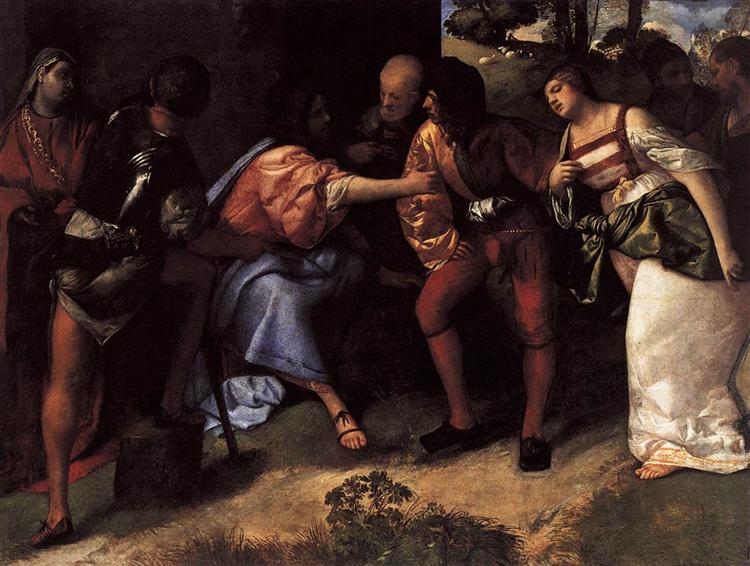Tanım
Titian's Christ and the Adulteress, painted in 1510, stands as a formidable example of the Venetian Renaissance and its ability to fuse the spiritual with the human in a profound visual dialogue. The painting captures a decisive moment in the biblical narrative found in the Gospel of John, which recounts the encounter between Christ and a woman accused of adultery, depicting divine mercy and justice through personal interaction.
The composition of the work is notable for its balance and the dynamic distribution of the characters. In the centre, Christ is presented with a serene posture, his face soft and full of confidence. His clothing, which displays a rich range of earthy and golden colours, contrasts with the simplicity of the woman kneeling before him. The woman, with an expression evoking both fear and vulnerability, is depicted with draping that suggests her dispossession and the gravity of the situation. Titian not only focuses on the emotions of his characters, but also invites the viewer to reflect on the theme of redemption.
The use of color in the work is masterful. Titian employs his famous vibrant palette, using lush yellow, brown, and contrasting blue tones that reinforce the emotional depth of the scene. The luminosity of the work, coming from the interaction of light with the textures of the fabrics and skin, brings the narrative to life, creating an environment charged with an almost dramatic atmosphere. The subtle nuances in the faces of the characters manifest a variety of emotions, from compassion and forgiveness in Christ to anguish in the adulteress.
In addition to the central figure of Christ and the woman, the painting also features other characters who attend the scene, some with expressions of disbelief and others with more inquisitive looks. These secondary characters, although less prominent, enrich the visual narrative and allow the observer to explore various interpretations of the message of the work. Titian succeeds in giving vibrant life to each figure, making the composition rich in detail and possible meanings.
In historical context, Christ and the Adulteress is set in a period of artistic exploration where the human figure is exploited to an unprecedented degree, with a special emphasis on emotion. Titian, a master in the use of light and colour, lays the groundwork for future movements in painting, especially in his approach to psychological portraiture.
The themes of redemption and forgiveness through compassion are present in several contemporary and later works, however, Titian's execution is distinguished by its emotional approach and technical prowess. In this regard, similar works might include "The Madonna of the House of Pesaro" or "The Rape of Europa." While each of these works addresses its own themes and narratives, they all share the psychological depth and coloristic mastery that characterize Titian.
In conclusion, Christ and the Adulteress is not only a testament to Titian's talent, but also a visual exploration of the concepts of judgment and mercy that invites contemplation. The painting stands as a reflection of the moral tensions of its time and an invitation to empathy, creating a space where history becomes a mirror of the human soul. Titian's ability to fuse biblical narrative with human emotional expression continues to resonate, making this work a perennial classic in the art world.
KUADROS ©, a famous painting on your wall.
Hand-made oil painting reproductions, with the quality of professional artists and the distinctive seal of KUADROS ©.
Painting reproduction service with satisfaction guarantee. If you are not completely satisfied with the replica of your painting, we will refund 100% of your money.

